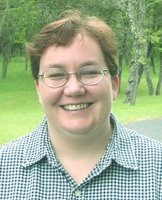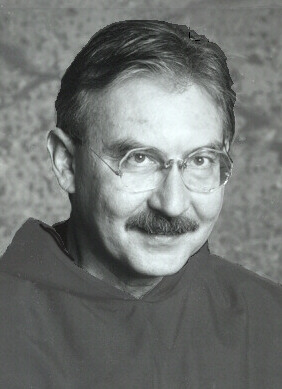Provincial Delegate's fall report
Louisiana
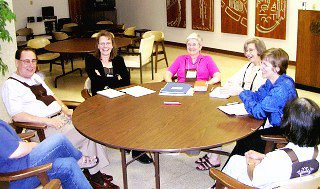 The Lafayette Council met with our Provincial Council in New Orleans on 25-Jun-05 [photo] to work out details of how to split this community which numbered 78 active members. The provincial council held an interesting debate on how to handle this situation since all our guidelines and rules for forming an OCDS community apply to a mother community founding a new one. But this was not a foundation; it was a split. Like the proverbial baby offered to Solomon, the community was split in half: right down the middle --half the council, half the novices, and half the membership, with exceptions made for the sick and elderly.
The Lafayette Council met with our Provincial Council in New Orleans on 25-Jun-05 [photo] to work out details of how to split this community which numbered 78 active members. The provincial council held an interesting debate on how to handle this situation since all our guidelines and rules for forming an OCDS community apply to a mother community founding a new one. But this was not a foundation; it was a split. Like the proverbial baby offered to Solomon, the community was split in half: right down the middle --half the council, half the novices, and half the membership, with exceptions made for the sick and elderly. 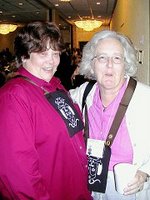
On 24-Aug-05, I appointed Elizabeth Boggess director of formation in Vidalia, [shown here with aspirant Camille Durkin] and former director of formation Anna Calhoun appointed councillor. Together with president Kot Morris, this gives our Vidalia Study Group a three member council. Anna’s resignation was submitted to Provincial Councillor Pascal Alfano during visitation on 30-Jul-05. She has been either director of formation or president there for almost thirty years, and kept this little group together.
Father Paul, assistant in Vidalia, was transferred to another parish in the diocese of Alexandria. Our Carmelites attended a farewell reception for him on 26-Jun-05.
The situation of our community in New Orleans remains still a mystery to this day, a full month and a half after Hurricanes Katrina and Rita hit the city. The two dealt this below-sea-level city a double whammy. The first flooded the city when the levee broke. But just as the water had been pumped out of the main sections and the Major planned to let residents back in to examine their property and retrieve their belongings, Rita brushed past New Orleans on its way to landfall in Port Arthur, broke the weakened levees, and re-flooded the city. Carmelite President Bruce Weaver urges members who have been displaced to attend meetings of Carmelite communities near their place of refuge. Of this community of 34 active members, I have only heard from or about ten. Marion Stearns drowned in Chalmette. She did not evacuate before Katrina flooded the city. Provincial Councillor Pascal Alfano’s home in Chalmette had water up to the roof line. “People in St. Bernard Parish lost everything and are living in someone’s garage somewhere on the North Shore or their family is two states away. St Bernard parish is uninhabitable.”
On September 27, a month after the first hurricane hit, our friars were able to get back into our House of Studies to clean up and haul out the refrigerator and freezer. Without drinkable water in our section of the city, it is hard to determine when we might be able to move back in. The two priests and two students, including our Fr. Provincial, are temporarily housed with our Nuns in Covington. Our seminarians have resumed classes in Covington while Notre Dame Seminary prepares their New Orleans campus for a January resumption of classes.
Texas
Hurricane Rita forced temporary evacuation of our Carmelites from Houston where we have both Nuns and four Secular Order groups. It took our nuns 23 hours to make a normal three hour drive from New Caney to San Antonio. Ernesto Mendoza helped evacuate our Missionary Carmelites of St Theresa from Deer Trail. Secular members took refuge with family members living in safer towns in the interior of Texas. Evacuation of our nation’s fourth largest city was no small task. Fortunately for Houston, Rita slowed from a category 5 hurricane to a 3 by the time it came ashore, and slammed into Port Arthur and Beaumont rather than Houston.
Eileen Mitrowski, professed 29-Jan-00, made her definitive Promise 29-Mar-03, passed away on 28 September at 2:00 am very peacefully. Eileen had suffered greatly for the past few months, but is now resting in God's loving arms. She is to be cremated, but the children are planning a memorial service at St. Luke's. Rebecca will be in contact with Matthew about the details - you'll hear from her with the details. Her example as a Carmelite has given all of us a great example of grace and love and the desire to always seek God's will in her life.
Georgia
 Ingrid Close [photo] transferred to our province from Eugene Oregon and has been working with me to revive our Savannah Study Group which transferred to Hilton Head South Carolina when Director of Formation Doris Hadden’s health no longer permitted her to travel to Savannah each month. With the help of the new Prioress of our nuns in Savannah, Sr. Jo Ann Gartner, Ingrid found a Nigerian priest Missionary of St Paul, who is pastor of St Benedict the Moor church to Assist. Father’s name is Desmond Ohankwere MSP. They had their first meeting at our Nuns on October 1 with seven attending. Fr. Desmond said Mass and gave a conference. I will be making visitation there on Saturday, 12-Nov-05, and hope to be able to profess members clothed in 1999 and 2002.
Ingrid Close [photo] transferred to our province from Eugene Oregon and has been working with me to revive our Savannah Study Group which transferred to Hilton Head South Carolina when Director of Formation Doris Hadden’s health no longer permitted her to travel to Savannah each month. With the help of the new Prioress of our nuns in Savannah, Sr. Jo Ann Gartner, Ingrid found a Nigerian priest Missionary of St Paul, who is pastor of St Benedict the Moor church to Assist. Father’s name is Desmond Ohankwere MSP. They had their first meeting at our Nuns on October 1 with seven attending. Fr. Desmond said Mass and gave a conference. I will be making visitation there on Saturday, 12-Nov-05, and hope to be able to profess members clothed in 1999 and 2002.Missouri
 What a delightful event it was to see so many of you at the national congress in St. Louis. Representing Texas were from Dallas: [pictured left to right: Jeanne Kamat, Katherine “Katy” Bready, Betty Turicchi, Estella Aleman, Wanda Anderson from Big Spring & president Ann Dawson], Ana Veronica Canek, Sylvia Cardenas, Lorraine Coleman, Celine Cozad, Birdie & David Ehrenfeld, Ileana Flores, Maria Garcia, Mary Giles, Dorothy Goodman, Dc. Steven Griesmyer, Gloria Guajardo, Oscar Hudson, Susan King, Maria Martinez-Lolita, Ernest & Anita Mendoza, Margaret Nunez, Natalie Ocansey, Victoria Rivera, Randy Scott, Jeannice Theriot, Pat Thompson, Georgina Torres, Catherine Varella, Mary Velez, Mirtala Villareal & Margaret Yong.
What a delightful event it was to see so many of you at the national congress in St. Louis. Representing Texas were from Dallas: [pictured left to right: Jeanne Kamat, Katherine “Katy” Bready, Betty Turicchi, Estella Aleman, Wanda Anderson from Big Spring & president Ann Dawson], Ana Veronica Canek, Sylvia Cardenas, Lorraine Coleman, Celine Cozad, Birdie & David Ehrenfeld, Ileana Flores, Maria Garcia, Mary Giles, Dorothy Goodman, Dc. Steven Griesmyer, Gloria Guajardo, Oscar Hudson, Susan King, Maria Martinez-Lolita, Ernest & Anita Mendoza, Margaret Nunez, Natalie Ocansey, Victoria Rivera, Randy Scott, Jeannice Theriot, Pat Thompson, Georgina Torres, Catherine Varella, Mary Velez, Mirtala Villareal & Margaret Yong.From Alabama, Steven Orleans, Paul Schubert & Carol Busma from Mobile, Thias Forrest, Marian Furman, Donna Lowe from Madison, Kathryn Ney & Ann Power. Representing Arkansas were Mary Armstrong, Giner Crews, Tricia Cromwell, isolates Carol Reuter, Edith & Joan Dore; Mary Howard & Anne Raney. From Georgia: John Eanes, Joe & Caroline McMahon, Rose Rabianski & Mary Shusta.
From Iowa were: Carmen Baumgartner, Martha Burchard, Michael Crane, Bernita Hanel, Tom & Martha Hanley, Roseann Hayek, Melissa Kuefler, Cindy Larkin, Andrea Liu, Mercedes Reyhons, Roxann Sorenson, Lavetta Vamosi & Amelia Wilken, From Kansas: Marian Ganser, Deborah Newton & Diana Scamman from Topeka.
From Louisiana were Assistant Fr Conley Bertrand from Lafayette; Beth Boggess, Camille Durkin & Kot Morris from Vidalia; Debbie Didier, Cynthia Fails, Terri Hebert, Cecile Jeanmard, Danithza Kufoy from Deridder, Mona Mayeux, Andy Ringle, Stephen Van Cleve & Anita Trahan.
From Oklahoma: Katherine Payne, Gary & Lolita Rodgers. From South Dakota: Agnes Gamiere & Lynda Healy. From Tennessee were Kathy De Wine, Missy Depersio, Jan Hicks & Jeanne Parella. And of course all our good hosts from the community of St. Louis.
 Special thanks to congress chairperson Joan Bohac [pictured here at planning of national council in 2004], to president Rita Tueth, to Sharon Schulte, to Lisa Johnston and to former president, Bob Albrecht who accepted the awesome task of hosting a national congress three years ago.
Special thanks to congress chairperson Joan Bohac [pictured here at planning of national council in 2004], to president Rita Tueth, to Sharon Schulte, to Lisa Johnston and to former president, Bob Albrecht who accepted the awesome task of hosting a national congress three years ago.The President and Director of Formation from our Gulf Coast community had to cancel. I have not heard from eight of our members down there. The whole region was practically wiped off the face of the map by Hurricane Katrina, with our members who survived, losing their home and all belongings except for the three day supply of clothes they took in evacuating. Nancy Murphy drowned in Bay St Louis. For news of the effects of the hurricanes, check out my blog, Katrina Hits Carmel at http://oklahomaocdsviewnewsl.blogspot.com/
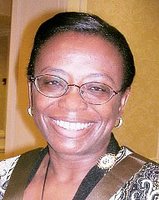 The sole representative from the state of Mississippi was Dorothy Ashley [photo], president of Jackson, although members of our Vidalia LA group live in Natchez.
The sole representative from the state of Mississippi was Dorothy Ashley [photo], president of Jackson, although members of our Vidalia LA group live in Natchez.Secretaries
A reminder to the secretaries of all our groups and communities. In the spring issue of Flos Carmeli I asked you to include in your community membership rosters, the birthdates (including the year, ladies!) 1st Promise and Definitive Promise dates for all professed members, and clothing dates for all novices. I think this plea went un-noticed since it was somewhat hidden under the title “Georgia.” I promise not to publish the year of your birth as long as you are alive! But I need that year for our records. It can be found on your initial application form. I fear we may have lost the records of many of our members in the recent hurricanes. It is important to have these vital statistics in our central records. Thanks to Alexandria, Covington, Oklahoma, St Louis, Cedar Rapids, Mobile and Little Rock for sending me this information. I still need it from the rest of you. Thanks.
OK, everybody. Here’s our memory lesson for today. Memorize the following sentence:
“Individuals do not start new communities, councils do.” So you have an isolate attached to your community. She wants to start an OCDS community in her town. Repeat (before she writes to me or to the provincial council):
